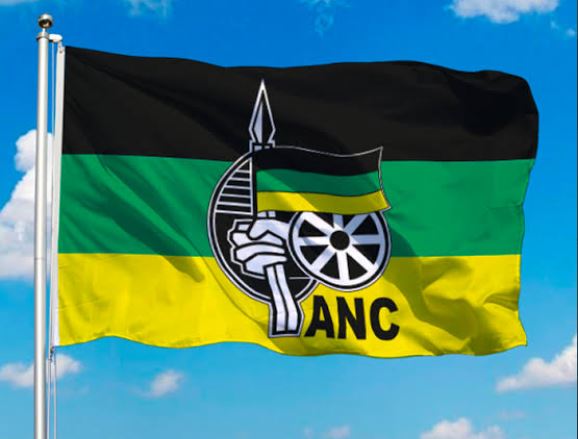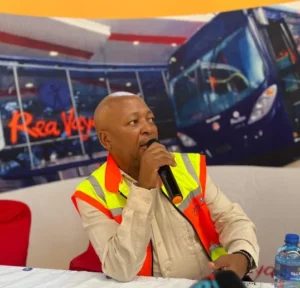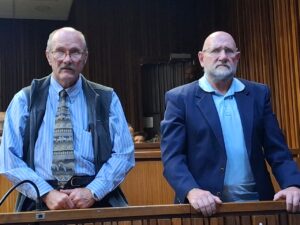By: Clyde Ramalaine
ANC liberation struggle stalwart Walter Sisulu, in his testimony in the 1963 Rivonia Trial under direct examination on the question of the banning of the congress responded with the following words: “We could not accept the ban on the African National Congress because it was the mouthpiece of the African people. It was the only hope that the African people had which could liberate them from oppression….” Hearing Walter Sisulu in this instance articulate the ANC as the mouthpiece and only hope for liberation for the African people, thus communicating the rationale to violate the imposed ban by the apartheid regime, sobers us all to know the historical centrality of the people for the ANC. It equally compels us to ask how relevant this is today with an ANC in office.
The ANC’s Constitution under aims and objectives as captured in Sections 2.3-4 reads as follow: “To defend the democratic gains of the people and to advance towards a society in which the government is freely chosen by the people according to the principles of universal suffrage on a common voters` role.” and 2.4 “To fight for social justice and to eliminate the vast inequalities created by apartheid and the system of national oppression.”
In a nutshell, with these articulations, the ANC sees itself as existing to defend the democratic gains of the people, fight for social justice, and eliminate the absolute gaping inequalities defining apartheid legacy. This musing intends to do three things. It firstly wants to ask what the ANC means with the defends of democratic gains of the people. Secondly, what does it understand with its articulated fight for social justice and lastly ‘the elimination of vast inequalities created by apartheid and the system of national oppression? It will ask who makes for the people as captured by the ANC’s Constitution.
“Hi Mzansi have we seen justice yet?” the January 6, published opinion piece by veteran and long-serving NEC, NWC, and Chairperson of the NEC – Social Transformation sub-committee member, Lindiwe Sisulu, set the cat among the pigeons for asking how South Africa has done in its necessary transformation journey in benefit of the people. Maybe we must understand her analysis in the spirit of these noble aims and objectives that detail a raison d’être of the ANC. It also must confirm a self-critique borne from the need to honour this commitment, meaning to defend the democratic gains the ANC herewith espouses.
It is a given that democracy as a system of governance, commonly accepted as the antithesis of the totalitarian and heretic apartheid system, is entrusted to hold the promises of the much-anticipated emancipation of the people. Defending the gains of democracy has as focus the people. To, therefore, appreciate the object of defending democracy, we must define the notion of the people. It cannot be conveniently understood in non-definitive and generics of all people.
However, it warrants asking why there was a liberation cause, a freedom intent, and a revolutionary mandate. At a philosophical level, one may justifiably contend that democracy at a fundamental level liberates both the oppressor and the oppressed since the oppressor is equally enslaved. The oppressor’s enslavement evidence instances, oblivious to their privileged disposition at the expense of the oppressed who constitute those denied equal humanity, warrants being liberated.
It must then be that a more sincere intention to surrender itself to defend the gains of democracy lays locked up in a search for a definition of who ‘the people are. Within the scope and definition of ‘the people,’ justice and its truthful evidence in meaningful life must be measured for those colonialism and apartheid abused. We dare not and cannot conveniently confuse the beneficiaries of colonial and apartheid rule in a simplistic commonality of the people. That beneficiary community was and remains white, and the victims remain black. Thus, a distinction of the people finds meaning in these two racially classified and economically divided groups. Emancipation for the white beneficiaries of colonial and apartheid rule can never translate to liberation for the victims, the disenfranchised, the abused black people.
To defend the gains of democracy is not mutually exclusive to ask and take stock of how far we had gone to serve the interest of reaching that place of equality in which the dividing line no more exists. Some may contend it’s utopian thinking to remotely hope for a future where the past is no more present. Then again, we must remain prisoners of hope. Yet to be prisoners of hope, we warrant being honest. This honesty compels us to ask what gains have we made to advance the cause of the people understood to be black as victims of apartheid. We must further qualify the notion of ‘the people’ in class categorisation in which we are not referring to the black elite but the black suffering masses for whom justice remains a mirage. Requesting us to introspect and self-critique constitutes an honest and necessary initiative since these are foundational aspects of growth towards realising the objectives of obliterating the vast inequalities that have come to define a South African society as the most unequal of in the world.
The late scholar and ANC leader Kader Asmal remind us of the centrality of the people as those for which a constitution should exist. “At a profound level, a Constitution is the embodiment of the will of the nation; if it is to enjoy legitimacy, it must come from the people. In other words, the authors of a Constitution must have a mandate from the people. This is why the Freedom Charter was so important.” This thinking on the part of Asmal places the people as central to the existence of a constitution meaning the Constitution has no legitimacy devoid of the people. It indeed does not exist in and of itself.
Therefore, it was disheartening to observe how the subject of self-criticism and introspection as advanced by Sisulu was deliberately waylaid by those who sought to shut her up in political expediency and cheap elitist embarrassment. It is even more disconcerting to see how so-called defenders of the South African Constitution deem it their inalienable right to violate the very Constitution in its fundamental expression of freedom of opinion and speech. This is the same crowd who seek to hinder a much-needed, long-overdue debate on the efficacy of the Constitution as an experienced reality for the black masses.
Instead of appreciating the central argument for such analysis as advanced by Sisulu, our discourse suffered attempted wreckage by those who have until now refused to engage honestly while claiming a custodianship of defence of the South African Constitution.
Another unfortunate component of the unfolding debate lends itself to ignoring the ANC in its constitutional expression on women. Let us hear the ANC as captured in Clause 3: 6, “The ANC shall support the emancipation of women, combat sexism and ensure that the voice of women is fully heard in the organisation and that women are properly represented at all levels.” We quickly discovered that the African National Congress in this epoch, as shown by those who came at Sisulu, had scant regard for the need to allow one of its own women to express herself and be heard.
The DSG Jessie Duarte, in her response to the debate in an article penned on February 3, rightfully asks a question: “Mzansi, why do you hate black women?” The Mzansi Duarte refers to, unfortunately, includes a cross-section of prominent elitist ANC leaders and supporters who are equally ignorant to appreciate Clause 3:6 as earlier alluded.
Maybe we must remind those who often claim a right to defend the Constitution that they are the very ones that do not respect the Constitution in its unequivocal and unambiguous assertion of the civil liberties of free speech as a non-negotiable.
Defending the gains of democracy is not a unilateral anti-free speech exercise as some in the ANC like Mvuso Msimang, Snuki Zikalala, Ronald Lamola, Firoz Cachalia, and others engaged in their responses. Unfortunately, these, along with what appears scripted, hired white-interest embedded voices which in the aftermath deemed it their inalienable right to condemn, denigrate and insult Sisulu, have perhaps never understood what it means to fight for social justice. The obsession with red-carding Sisulu’s free-thinking in one-dimensional conclusion as an attack on the Constitution and the judiciary, therefore an attack on the gains of democracy is unfortunately not sustainable.
We must ask what then to make of the ANC binding itself to a perpetual fight for social justice? Does it acknowledge the reality of injustice in broader than an apartheid past sense, or does its articulation need revisiting? Naturally, the aggregate ANC leader or defender will say there is no need to rethink its expression in a fight for social justice. They rightfully would contend that the gains for such social justice warrant defending because it is not yet attained even if it were to be reached would remain relevant.
While the historical context of the ANC’s existence has our apartheid past as its cradle and the central reality, it could not, with the death of statutory apartheid, abandon its fight against social justice. Is there any merit to argue that the ANC did not understand the implications of its own statement as terminal and limited to apartheid? Or did the ANC accept that the quest for social justice would remain a search regardless of apartheid or democratic context? Furthermore, suppose we accept such appreciation for the wide arc of a search for social justice as an ongoing reality. In that case, we must also acknowledge that the ANC was ready to be judged if not condemned for its gross failures to work for social justice regardless of who leads.
Perhaps the tension is less in the analysis and critique of a plethora of failures, but Sisulu’s question spotlights the Constitution. While we all know the Constitution remains a living document subject to engaging, review, and rethink, all this does not automatically translate to an attack on its existence. SA soon learned what some of us always knew: those in SA will not entertain any critique of the Constitution. These go from failure to read what is being said to the thoughtless defence of a Constitution they regard as holy, inerrant, infallible, and under attack by what some have coined a fightback strategy.
Again the quest for social justice in a democratic space necessitates engaging the Constitution since it ought to hold the raw material to enable that justice quest. Any pursuit for the social and economic transformation of the disenfranchised masses brings the Constitution into focus. However, we have observed that the Constitution remains silent on a few fundamental issues. Notably, while it refers to the South African past, it gives such a past a generic, less defined status and meaning rendering the objective to work against such history as challenging when it fails to articulate it. We must then warrant asking why the Constitution of South Africa opts to be silent on explaining the past? As I have elsewhere contended, does this translate to a mistake or deliberate intention on the part of the constitutional elites that led South Africa into adopting it?
In her address to Lamola, Sisulu asks the pertinent question as advanced by a younger generation to those who romanticize about their role in its drafting. Is it possible that the beneficiaries of colonial and apartheid systems that remain the signpost of true economic power know the Constitution works for them? How is it that the beneficiaries of colonial and apartheid systems are so defensive and protective of this Constitution if it exists to undo the unrighteous and immoral gains of a white minority when it holds the mandate to work for equality of the black masses?
Some elites in the ANC are embarrassed by the tough questions Sisulu raises on the practical implementation of aborted justice. I have elsewhere asked who needs such a fragile Constitution that so quickly comes under attack and constantly faces threats, as is the claim? Suppose the Constitution works for the beneficiaries of ill-begotten wealth and land inherent in a white minority; how can it simultaneously obliterate the vast inequalities that define SA life in racial differentiation of white wealth and black abject poverty?
What then to make of the claim that the Constitution of SA is the solution that the ANC claims in its noble articulations? The missing link is and remains ‘the people. The people are necessarily black and still nowhere near any form of socio-economic equality justice with the whites who vehemently defend this Constitution. Is it possible that the people make up the minority whites? Is the ANC in 2022 not the mouthpiece and hope of white people’s economic freedom and interests?
*Clyde N.S. Ramalaine
Political Analyst







